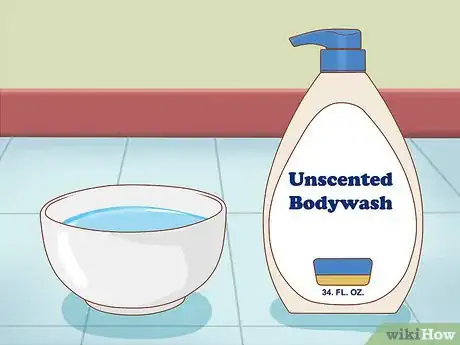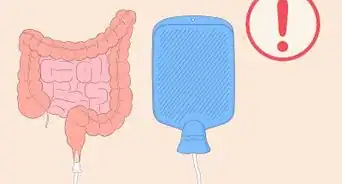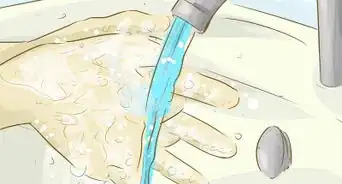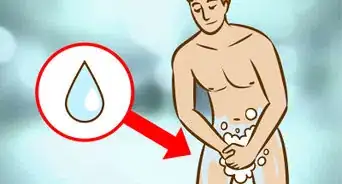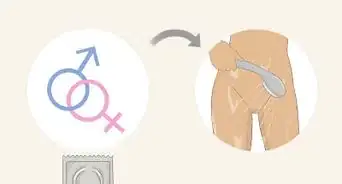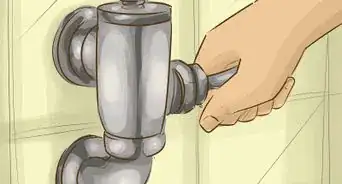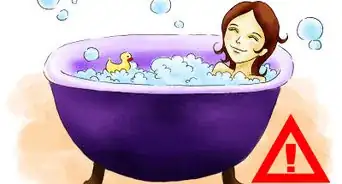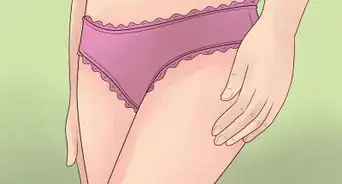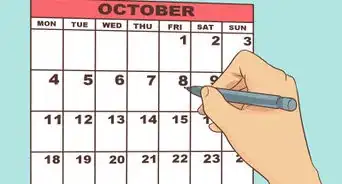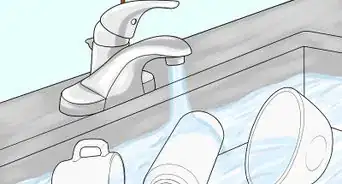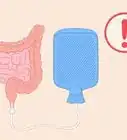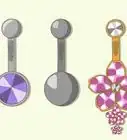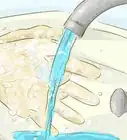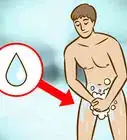This article was co-authored by Indy Chabra, MD, PhD and by wikiHow staff writer, Megaera Lorenz, PhD. Dr. Indy Chabra is a Board Certified Dermatologist and a Board Certified Mohs Micrographic Surgeon. He is the Founding Member of DMC Dermatology & Mohs based in Tucson, Arizona. With over 15 years of experience, he provides medical, surgical, and cosmetic dermatology care for adult and pediatric patients. Dr. Chabra earned a BS in Chemistry and Biological Sciences and an AB in Economics from Stanford University. He also received his MD and PhD in Microbiology and Genetics from Stony Brook University. He completed his Dermatology residency at the University of Pittsburgh Medical Center (UPMC), Pittsburgh. While at UPMC, Dr. Chabra received extensive training in complex Medical Dermatology, hair and nail conditions, Pediatric Dermatology, Cosmetic Dermatology, and Mohs Skin Cancer Surgery. Dr. Chabra is a Fellow of the American Society for Mohs Surgery, a Fellow of the American Academy of Dermatology, and a Fellow of the American Society for Dermatologic Surgery. Dr. Chabra also provides in-patient Dermatology consults at Tucson Medical Center.
There are 11 references cited in this article, which can be found at the bottom of the page.
wikiHow marks an article as reader-approved once it receives enough positive feedback. In this case, several readers have written to tell us that this article was helpful to them, earning it our reader-approved status.
This article has been viewed 3,025,620 times.
Your belly button is easy to overlook, but it needs to be cleaned just like every other part of your body. Fortunately, all it takes to keep your belly button clean is a little soap and water! If you have unpleasant belly button odor that doesn’t go away with regular washing, check for signs of an infection. With proper medical treatment, you can clear up the source of the odor and get back to smelling fresh and clean.
Steps
Creating a Regular Cleansing Routine
-
1Wash your belly button whenever you shower. The best time to clean your belly button is during a regular bath or shower. Make an effort to include your belly button in your daily washing routine.[1]
- You may need to wash your belly button more frequently if you’ve been sweating a lot (e.g., after exercise or when the weather is hot).
-
2Use plain soap and water for routine washing. You don’t need anything fancy to wash your navel. Warm water and gentle soap will do the trick just fine! Apply some soap and water to your fingers or a washcloth and gently rub it into your belly button to get rid of dirt, grime, and lint. When you’re done, carefully rinse away all the suds.[2]
- In general, the soap or cleanser you use for the rest of your body should work fine for your belly button. Use a gentle, unscented soap or bodywash if scented soaps cause drying or irritation.
- You can also use saltwater to gently cleanse your belly button. Mix 1 teaspoon (about 6 g) of table salt with 1 cup (240 mL) of warm water and dip a washcloth in the solution. Carefully massage the saltwater into your navel, then rinse it away with plain water.[5]
- Saltwater can kill germs and loosen dirt, and you may find it less drying and irritating than soap.
Tip: If your belly button is pierced, you’ll need to take special care to keep it clean. Use a warm saltwater solution to clean the area around the piercing at least 2-3 times a day, or as often as your piercing artist or doctor recommends.[3] Belly button piercings can take a long time to heal, so you may need to keep up this routine for several months or up to a year.[4]
Advertisement -
3Deep-clean an innie with a washcloth or cotton swab. It’s easy for dirt and lint to build up in a deep belly button—and it can be challenging to get it out! If you have an innie, you may need to use a washcloth or a cotton swab to get inside and do a thorough cleaning.[6] Swab out the inside of your belly button gently with soap and water, and make sure to rinse it well afterward.
- Don’t scrub hard—you could irritate the delicate skin in and around your belly button.
-
4Pat your belly button dry when you’re done. It’s important to keep your belly button dry to prevent an overgrowth of bacteria and fungus. Once you’re done washing up, use a clean, dry towel to gently dry the area in and around your belly button. If you have time, you can also let it air-dry for a few minutes before putting on clothing.[7]
- You can keep moisture from building up in your belly button by dressing in cool, loose clothing when the weather is warm or any time you might break a sweat.
-
5
Dealing with Persistent Belly Button Odors
-
1Look for signs of infection if regular washing doesn’t work. The most common cause for unpleasant belly button odors is dirt and sweat. In most cases, washing up with a little soap and water will clear up any unwanted smells. If it doesn’t, you might have an infection. Look for symptoms such as:[10]
- Scaly red skin
- Tenderness or swelling in or around your belly button
- Itching
- Yellow or green fluid or pus leaking from your belly button
- Fever or general feelings of illness or fatigue
Warning: Infections are more likely if you have a belly button piercing. If you have a piercing, look out for signs of infection such as increasing pain or tenderness, swelling, redness, warmth around the piercing, or pus.
-
2See your doctor for a diagnosis if you have infection symptoms. If you think you have an infection, make an appointment with your doctor right away. They can evaluate what kind of infection you have and tell you how to treat it properly.[11]
- The appropriate treatment will be different depending on whether your infection is caused by bacteria, fungus, or yeast. Don’t try to guess what kind of infection you have, since using the wrong treatment could do more harm than good.
- Your doctor may swab your belly button to get a sample for testing. This can help them determine what’s causing your infection.
-
3Use topical medications to treat a bacterial, fungal, or yeast infection. If it turns out you have an infection in your belly button, you may need to use an antibiotic or antifungal ointment or powder for a while to clear it up. Your doctor may prescribe medication or instruct you to buy one over-the-counter. Treating the infection should also get rid of any nasty odors or discharge![12] Follow any other home care instructions your doctor may have, such as:
- Resisting the urge to scratch or pick at your infected belly button
- Changing and washing your bedsheets and clothing regularly to prevent reinfection
- Avoiding sharing towels with other people
- Wearing loose, comfortable clothing to help keep your belly button cool and dry
- Cleansing your belly button daily with a saltwater solution
-
4Ask your doctor to drain a belly button cyst if you have one. Sometimes a cyst can form in your belly button, potentially leading to swelling, pain, and bad-smelling discharge. If you have an infected cyst in your belly button, your doctor will probably drain the cyst in their office. They may also prescribe oral or topical antibiotics to help clear up the infection. Follow their home care instructions to help the cyst heal properly.[13]
- Ask your doctor for detailed instructions on how to clean and care for your cyst at home. They may recommend putting a warm, dry compress over the area 3-4 times a day. If they applied a dressing, you will need to change it at least once a day until your doctor says you can stop using it.[14]
- If your doctor packed the cyst with gauze, you’ll need to return to have it removed after 2 days. Wash the wound with warm water once a day until it heals (usually within 5 days).[15]
- If the cyst comes back, you might need to have surgery to remove it completely. For deep cysts, such as urachal cysts, the surgeon will probably make a tiny incision and remove the cyst using delicate instruments, guided by a camera.[16]
- You will likely need to stay in the hospital for 2-3 days after the surgery, and should be able to return to your regular activities in about 2 weeks.[17]
-
5Visit your doctor to get navel stones removed if necessary. If you have a deep belly button and don’t clean it often enough, dirt, lint, and oils can build up inside it. Eventually, these materials can form a hardened mass, called an omphalith or navel stone.[18] If this happens to you, make an appointment with your doctor. They can use forceps to gently pull out the stone.
- In many cases, navel stones don’t cause any symptoms. Sometimes, however, they can cause sores and infections to develop.
- You can prevent navel stones by cleaning your belly button regularly with soap and water.
Community Q&A
-
QuestionWhat happens if navel stones form?
 wikiHow Staff EditorThis answer was written by one of our trained team of researchers who validated it for accuracy and comprehensiveness.
wikiHow Staff EditorThis answer was written by one of our trained team of researchers who validated it for accuracy and comprehensiveness.
Staff Answer wikiHow Staff EditorStaff AnswerIt's best to have a doctor remove the navel stones for you. To prevent them from forming, clean your belly button regularly and check it occasionally (e.g., once a week) to make sure lint and dirt aren't building up inside.
wikiHow Staff EditorStaff AnswerIt's best to have a doctor remove the navel stones for you. To prevent them from forming, clean your belly button regularly and check it occasionally (e.g., once a week) to make sure lint and dirt aren't building up inside. -
QuestionMy belly button is always leaking clear fluid, and I am forced to clean it many times daily. What may this be?
 wikiHow Staff EditorThis answer was written by one of our trained team of researchers who validated it for accuracy and comprehensiveness.
wikiHow Staff EditorThis answer was written by one of our trained team of researchers who validated it for accuracy and comprehensiveness.
Staff Answer wikiHow Staff EditorStaff AnswerAny kind of discharge from your belly button could be a sign of infection. Make an appointment with your doctor to have it looked at. They can identify the cause and help you treat it appropriately.
wikiHow Staff EditorStaff AnswerAny kind of discharge from your belly button could be a sign of infection. Make an appointment with your doctor to have it looked at. They can identify the cause and help you treat it appropriately. -
QuestionDoes it hurt when you clean your belly button?
 wikiHow Staff EditorThis answer was written by one of our trained team of researchers who validated it for accuracy and comprehensiveness.
wikiHow Staff EditorThis answer was written by one of our trained team of researchers who validated it for accuracy and comprehensiveness.
Staff Answer wikiHow Staff EditorStaff AnswerSome people have very sensitive navels, so it's possible you might feel some pain or discomfort if you don't handle your belly button gently. If you're sensitive, avoid scrubbing your belly button and just gently massage it with soap and water or a saltwater solution.
wikiHow Staff EditorStaff AnswerSome people have very sensitive navels, so it's possible you might feel some pain or discomfort if you don't handle your belly button gently. If you're sensitive, avoid scrubbing your belly button and just gently massage it with soap and water or a saltwater solution.
Warnings
- If you suspect you have an infected navel piercing, make an appointment with your doctor right away to get appropriate treatment.⧼thumbs_response⧽
- Never try to clean or remove lint from your belly button with a sharp object, such as a pair of tweezers or a metal manicure tool, since you could injure yourself. Always use your fingers or a clean cloth or cotton swab.⧼thumbs_response⧽
Things You'll Need
- Warm water
- Mild soap or body wash
- Washcloth
- Cotton swabs
References
- ↑ https://www.medicalnewstoday.com/articles/320706.php
- ↑ https://www.medicalnewstoday.com/articles/320706.php
- ↑ https://share.upmc.com/2015/07/how-to-keep-your-bellybutton-navel-clean-the-right-way/
- ↑ https://www.medicalnewstoday.com/articles/323547.php
- ↑ https://share.upmc.com/2015/07/how-to-keep-your-bellybutton-navel-clean-the-right-way/
- ↑ https://www.teenvogue.com/story/how-to-clean-your-belly-button
- ↑ https://www.medicalnewstoday.com/articles/320706.php
- ↑ https://share.upmc.com/2015/07/how-to-keep-your-bellybutton-navel-clean-the-right-way/
- ↑ https://www.teenvogue.com/story/how-to-clean-your-belly-button
- ↑ https://www.medicalnewstoday.com/articles/320706.php
- ↑ https://www.medicalnewstoday.com/articles/320706.php
- ↑ https://www.medicalnewstoday.com/articles/319864.php
- ↑ https://www.medicalnewstoday.com/articles/319864.php
- ↑ https://myhealth.alberta.ca/Health/aftercareinformation/pages/conditions.aspx?hwid=uh2789
- ↑ https://www.fairview.org/patient-education/116518EN
- ↑ https://eapsa.org/parents/learn-about-a-condition/p-z/urachal-cysts/
- ↑ https://www.ncbi.nlm.nih.gov/pubmed/11025696
- ↑ https://www.ncbi.nlm.nih.gov/pmc/articles/PMC5071274/
- ↑ http://www.bbc.com/future/story/20150709-the-curious-truth-about-belly-button-fluff
About This Article
To clean your belly button, use your finger or a washcloth to rub some warm, soapy water into it, which will get rid of any dirt, grime, and lint. Alternatively, you can stir 1 teaspoon of salt into a cup of water and use that to clean your belly button, since saltwater also kills germs and can be less irritating than soap. Either way, make sure you pat your belly button dry when you're finished to prevent bacteria from growing in it. Generally, you should aim to clean your belly button whenever you shower, but you might want to clean it more if you've been sweating a lot. For tips on how to deal with belly button odors, scroll down!

